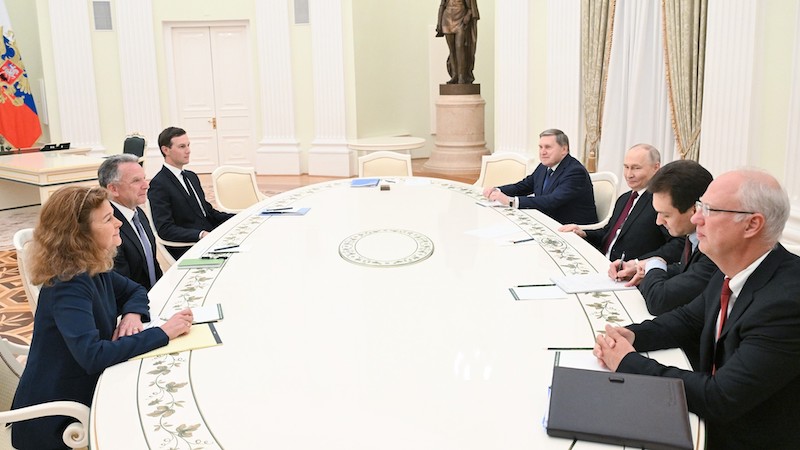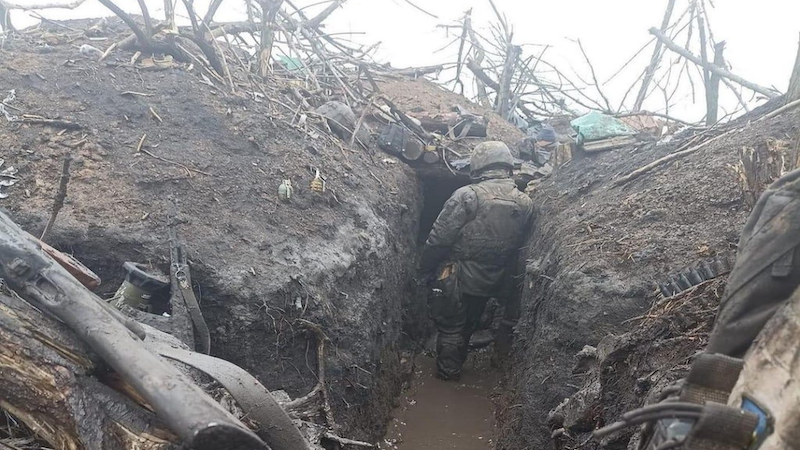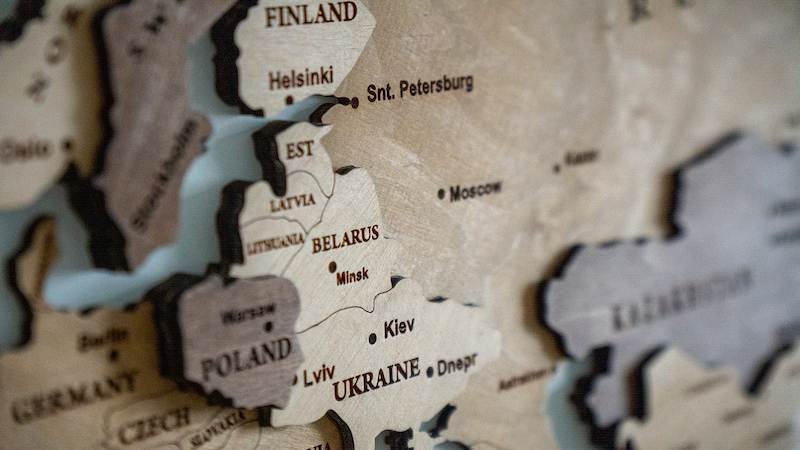Ukrainians know Donald Trump’s Ukraine deal is a betrayal, even if Volodymyr Zelensky and others have to keep flattering Trump in the hope he...
Vous n'êtes pas connecté
- English
- Français
- عربي
- Español
- Deutsch
- Português
- русский язык
- Català
- Italiano
- Nederlands, Vlaams
- Norsk
- فارسی
- বাংলা
- اردو
- Azərbaycan dili
- Bahasa Indonesia
- Հայերեն
- Ελληνικά
- Bosanski jezik
- українська мова
- Íslenska
- Türkmen, Түркмен
- Türkçe
- Shqip
- Eesti keel
- magyar
- Қазақ тілі
- Kalaallisut ; kalaallit oqaasii
- Lietuvių kalba
- Latviešu valoda
- македонски јазик
- Монгол
- Bahasa Melayu ; بهاس ملايو
- ဗမာစာ
- Slovenščina
- тоҷикӣ ; toğikī ; تاجیکی
- ไทย
- O'zbek ; Ўзбек ; أۇزبېك
- Tiếng Việt
- ភាសាខ្មែរ
- རྫོང་ཁ
- Soomaaliga ; af Soomaali
Headings :
 Maroc - EURASIAREVIEW.COM - A la une - 23/08/2024 11:40
Maroc - EURASIAREVIEW.COM - A la une - 23/08/2024 11:40
Ukraine Is Playing With Fire In Kursk – OpEd
Much media attention has focused on Ukraine’s surprise invasion of the Kursk region in Russia. Russia’s President Vladimir Putin has obviously been unsettled by it. But whether it is a good idea for Ukraine is questionable. Although Ukraine has been tight-lipped about most information concerning its offensive, analysts have speculated thatit was trying to relieve the pressureof a slowly advancing Russian offensive on its own territory by making Russia divert attacking forces to defend its own territory. Another postulated Ukrainian objective is to deliver a psychological jolt to Russia and energize flagging support at home and abroad for the war. Finally, it is argued that taking Russian territory might be used as a bargaining chip to get Russia to give up more Ukrainian territory in any potential peace negotiations. Only if Ukraine is serious about quickly ending the war and negotiating peace with Russia might this invasion be a good idea. Otherwise, it is a risky offensive undertaken merely for psychological effects. Offensive warfare usually incurs more casualties and burns more weapons and equipment than being on the defense, especially if the defensive side is entrenched, has other battlefield fortifications, or can make the most of rivers, high ground, forests, or other terrain advantages. If nothing else, looking strategically at the entire war, Ukraine going on the offensive when it is already outmanned and outgunned and is facing a simultaneous enemy offensive may make this numerical disadvantage worse. In this case, given Russia’s substantial advantage in battlefield numbers and weapons, the Ukrainian incursion may not even cause Russia to divert troops from its slowly advancing offensive in Ukraine to fortify the Kursk region. Russia may just try to force the Ukrainians out by throwing more conscripts at them rather than taking forces from their own offensive in Ukraine. In fact,reportsare that the Ukrainians are transferring forces to their offensive from already thin defensive lines facing Russian pressure. Furthermore, trying to hold this pocket in Kursk, which is surrounded on three sides by Russians and connected by an ever-lengthening—and thus more vulnerable—supply line is dangerous and might even be catastrophic. It looks as if, at the time of writing, the Ukrainians are digging in to defend their gains in Russia. But if their seemingly precarious supply line is cut, the Ukrainians could be surrounded. This invasion of Russia when the Russians are advancing in Ukraine illustrates that militaries in general tend to be enamored with the swagger of bold actions to “take the fight to the enemy.” Yet often there are substantial advantages to being on defense, especially when the defensive force can usually pick the terrain on which it will fight. And despite Ukrainian heroics in general in repelling a superior invader from effacing their country, Ukraine has already experienced one failed offensive in the war. It is to be hoped that Ukrainian leaders will realize that holding this ground in Russia will be too risky and thus convert the operation into one big hit-and-run raid by withdrawing their forces before they are surrounded and trapped. They have already reaped their psychological gains from the surprise operation on enemy soil, making Russia apprehensive that its long border is insecure. As for U.S. policy, American policymakers were taken off-guard by the Ukrainian move and were forced to inquire about the objective of the invasion, thus implicitly revealing skepticism of the entire venture. This information gap indicates that—as with other allied countries that the United States supplies with weapons, technology, training, and military know-how—American leaders don’t regularly demand sufficient advanced insight into and influence on allies’ intended military actions, strategy, tactics, and goals. This knowledge deficit seems to intentionally result from American leaders wanting to maintain distance from an ally’s military decisions so they can claim that the United States is not pulling the puppet strings, especially when possible escalation exists with a nuclear-armed great power, such as Russia. If, however, American leaders do not want to turn military and economic support for Ukraine over to the Europeans, who should have a much greater stake in the game than the United States, they should at least monitor Ukraine’s objectives, intentions, strategy, and tactics more closely to keep the country from hurting its own cause. And U.S. policymakers should start preparing the American public and the Ukrainian government and exhausted populace for the likelihood that any settlement of the war will require Ukraine to give up some of its territory to Russia. However, such a settlement should not be dishonorable to Ukraine. The Ukrainians have fought gallantly to successfully maintain their country’s existence in the face of an invasion by a much greater military, economic, and political power. Even the Finns, who repelled a similar Russian invasion in the Winter War of 1940, had to give up some territory. Yet today, the world remembers Finland as bravely fending off the behemoth next door, as they will the Ukrainians for their brave defense against an aggressive attempt to erase their country from the map. This article was also published in The American Conservative
Articles similaires
This Trump betrayal can be stopped
Ukrainians know Donald Trump’s Ukraine deal is a betrayal, even if Volodymyr Zelensky and others have to keep flattering Trump in the hope he...
An Oligarch’s Guide To Ending The War In Ukraine – OpEd
Here’s how oligarchs play their game of geopolitical three-card monte. They attract attention by promising the moon. Then they hide their real...
'This is unacceptable’: Trump’s niece calls out his 'weak-kneed' approach with Putin
President Donald Trump's niece and vocal critic has called her uncle out for the peace proposal that she says puts Ukrainians — and global democracy...
The Donbas And Beyond: The Territorial Barriers To Peace In Ukraine – Analysis
By Steve Gutterman Amid a fast-paced flurry of diplomacy over a US push for a peace deal, Ukrainian President Volodymyr Zelenskyy said on December...
Ukraine was Russian — Historically – OpEd
By Jonathan Power “George, you have to understand that Ukraine is not even a country. Part of its territory is in Eastern Europe, and the greater...
Anna Danylchuk: Kremlin PUSHES Trump deal for UKRAINE CAPITULATION
Journalist and YouTube blogger Anna Danylchuk in UATV studio analyzes explosive leak exposing Kremlin's direct role in crafting so-called "peace...
Trump is doing everything in his power to make sure Putin gets what he wants
Almost lost among Donald Trump’s latest assault on America, has been his utter disdain for our democracy, and love for Russian President Vladimir...
Russia refuses to comply with ECHR ruling on deported children and MH17 flight — conclusions of the Council of Europe’s Committee of Ministers
The Russian Federation is not implementing the ruling of the European Court of Human Rights (ECHR) in the case “Ukraine and the Netherlands v....
US, Ukraine Discuss Peace, But No Immediate Breakthroughs Seen In Miami Talks
US and Ukrainian officials met for a third straight day of talks, with no early announcements about any potential breakthroughs, even as Russia and...
Latest releases
-
American Airlines invites AAdvantage members to help make a dierence this Giving Tuesday
AMERICAN AIRLINES - 01/12/2025
-
American Airlines to present at Goldman Sachs and Bernstein conferences
AMERICAN AIRLINES - 26/11/2025
-
American Airlines gets ready to unwrap deals for travelers this holiday season
AMERICAN AIRLINES - 25/11/2025
-
Belkin Expands Audio Range in the Middle East with SoundForm Anywhere True Wireless Earbuds
Belkin - 24/11/2025
-
Border Patrol Agents Face Shots Fired, Vehicle Rammings, Bricks Thrown in Chicago on Saturday
Amazon Web Service - 09/11/2025
-
Border Patrol Agents Face Shots Fired, Vehicle Rammings, Bricks Thrown in Chicago on Saturday
The Department of homeland security - 09/11/2025
-
ICE Arrests Worst of the Worst Criminal Illegal Aliens Including Pedophiles, Rapists and Violent Assailants
The Department of homeland security - 07/11/2025
-
DHS Sets the Record Straight on Misleading Video, Leaving Out Key Facts Including that the Woman Arrested Repeatedly Stabbed Her Coworker with Scissors
The Department of homeland security - 07/11/2025
-
United Airlines Launches MileagePlus Debit Rewards Card that Earns Miles for Spending and Saving
UNITED AIRLINES - 04/11/2025
-
American Airlines and AAdvantage members donate more than $1.2 million for Hurricane Melissa relief eorts
AMERICAN AIRLINES - 31/10/2025








